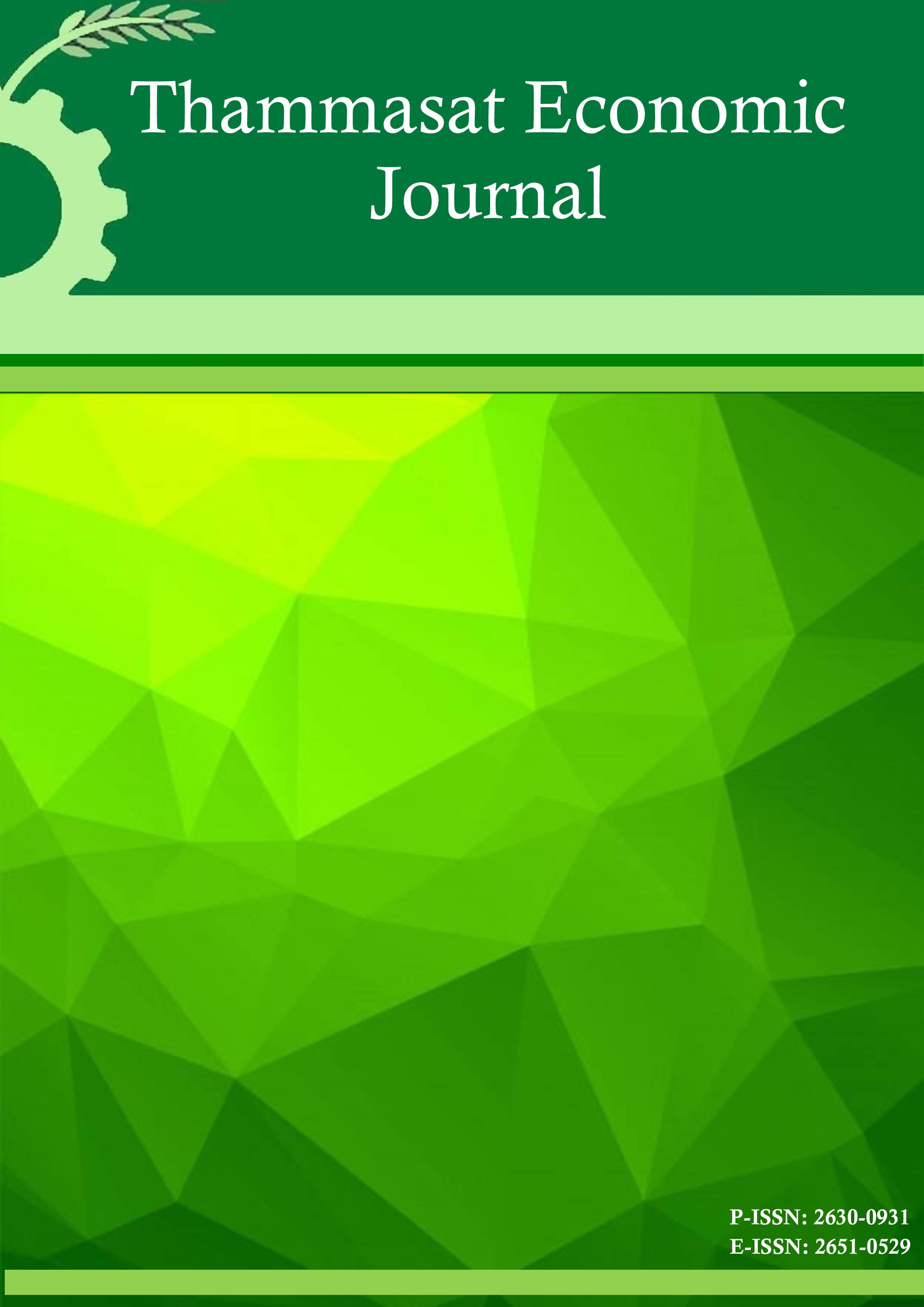The determinants of happiness among Thai people
Some evidence from Chai Nat and Kanchanaburi
คำสำคัญ:
Happiness, Income, Relative poverty, Contentmentบทคัดย่อ
This study examines the level of happiness of Thai population in Chai Nat and Kanchanaburi provinces and its relationship to various determinants. Economic status perspectives in terms of “objective” (income, debt burden) and “subjective” (a feeling of relative poverty to their neighbors) factors are used as happiness determinants. The paper also examines the effects of non economic factors on happiness including formal education attainment, physical health and perceived quality of the areas in which people live. Having analyzed these effects, it is found that despite their different geography, the findings of two provinces are similar. While the effect of income on happiness is inconclusive, the most important predictor is a feeling of being not poor compared to neighbors which is self interpreted as a feeling of contentment with what one has. The policy of training one’s mind of contentment accompanying with working hard through fair and righteous means, which is a Buddhist teaching of Blessings of Life, should lead to real well-being and peace not only for Thailand but also other countries if adopted.
เอกสารอ้างอิง
2. Borooah, Vani K. (2006). “What Makes People Happy? Some Evidence from Northern Ireland,” Journal of Happiness Studies 7: 427-465.
3. Chan, Y. K.& Rance P.L. Lee. (2006). “Network Size, Social Support and Happiness in Later Life: A Comparative Study of Beijing and Hong Kong,” Journal of Happiness Studies 7: pp.87-112.
4. Coombs, R. (1991). “Marital Status and Personal Well-Being. A Literature Review,” Family Relations 40: pp. 97-102.
5. Deiner, E.et al., (1999). “Subjective Well-Being. Three Decades of Progress.” Psychological Bullatin 125: pp. 276-283.
6. Deolalikar, Anil B. (2002). “Poverty, Growth and Income Inequality in Thailand.” ERD Working Paper No. 8. Manila: Asian Development Bank.
7. Frey, B & Slutzer, A. (2002). Happiness and Economics. Princeton University Press, Princeton.
8. Gough, I. & Doyal, L. (1991). A Theory of Human Need. The Macmillan Press, Basingstoke.
9. Gray, Rossarin Soottipong, Pungpond Rukumnuaykit, Sirinun Kittisuksathit & Varachai Thongthai. (2008). “Inner Happiness Among Thai Elderly.” Journal of Cross Cultural Gerontology. DOI 10.1007/s10823-008-9065-7.
10. Janakarajan, S. & Seabright, P. (1999). “Subjective and Objective Indicators of Welfare Change Over Time,” Ill-fare in India. Sage, Delhi.
11.Lane, R. E.(2000). The Loss of Happiness in Market Eeconomies. Yale University Press, New Haven.
12. Lauro, Don (1979). “The demography of a Thai village.” Unpublished Ph. D. Dissertation. Research School of Social Sciences, Australian National University, Canberra.
13. Layard, R. (2005). Happiness: Lessons from a New Science. Allen Lane, London. Michalos, Alex C. (2007). “Education and Happiness.” Paper written for the International Conference on Is happiness measurable and what do those measures mean for public policy?, At Rome, 2-3 April 2007.
14. Moller, V. (2005). “Researching Quality of Life in a Developing Country: Lessons from the South African Case.” In I. Gough & A. McGregor (eds.), New approaches and research strategies. Cambridge University Press, Cambridge.
15. National Statistical Office. (2002). “Population and Housing Indicators in Thailand: Based on Population and Housing Census Data: 1980, 1990 and 2000”. Thailand: National Statistical Office.
16. Podhisita, Chai. (1985). “Buddhism and the Thai World View.” In Amara Pongsapich, et al (eds.), Traditional and Changing Thai World View. Social Science Research Institute, Chulalongkorn University, Bangkok.
17. Veenhoven, R. (1997). “Advances in understanding happiness,” Revue Quebecoise de Psychologie 18: 29-74. English version available on line http://www.eur.nl/fsw/personeel/happiness/.
18. Waite L., & M. Gallagher. (2000). The Case for Marriage. Why Married People are Happier, Healthier and Better off Financially?. Doubleday, New York.







